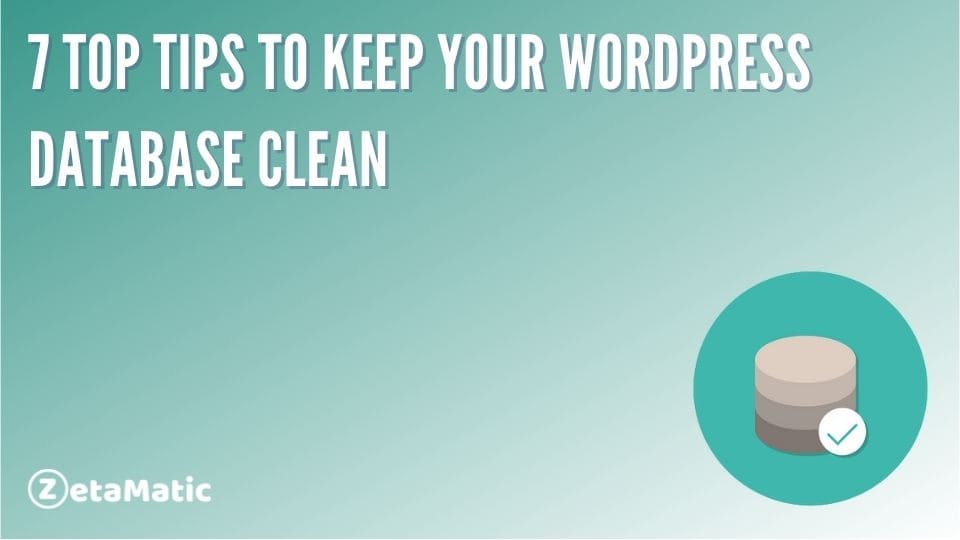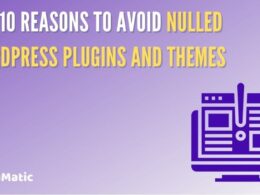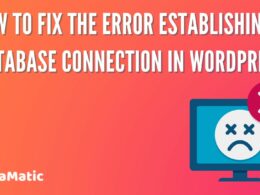Are you interested in keeping your WordPress database clean? The database is something that is difficult to replace or modify. It is your website’s heart and soul, and you must keep it as secure and functional as possible. However, how do you keep it clean? This post will teach you about it.
If you’ve been using a WordPress site for a while, chances are it’s time to clean it up. This could be the solution you’ve been looking for to improve your website’s load speed and eliminate periodic crushes.
There’s a good chance your database is bloated with useless tables that slow down and bloat your website. Regular cleanups will aid in reducing the size of the database, resulting in faster backups and load times.
This article will go over some of the most important tasks you must perform in order to keep your WordPress database as clean as possible. This article focuses on plugins and SQL queries.
1. Before you clean your WordPress database, make a backup

Make a backup of your database before installing any database maintenance software or performing any other type of cleanup.
Computer systems have their own minds, and the last thing you want is to lose your important data because you were in a rush to improve it.
Human errors and system failures are common. Before beginning any maintenance work, you must always create a backup. If something goes wrong, you’ll need a fresh copy on hand to restore everything. Don’t take chances with the lifeblood of your online business.
2. Delete unused plugins to clean WordPress database

The more plugins you have installed on your WordPress site, the longer it will take to load, depending on whether it is front-end or back-end. Front-end plugins add more JavaScript and CSS files to your website, slowing it down and taking up database space.
This is due to the fact that each plugin is a separate line of code that a browser must load when a page is loaded. Webmasters frequently forget to delete unused plugins. As a result, their website becomes bloated.
Searching for and deleting unused/disabled/unnecessary plugins is one of the best ways to declutter your WordPress database.
If you’re like most people, you enjoy trying out new plugins, and it’s likely that you’ll forget to delete the majority of them. You may also end up installing plugins that perform the same function.
In any case, it’s a good idea to spend some time going through your plugin list and deleting the ones you never use. To save space or take up less space in the database, you should remove unused plugins or replace them with better options. This is one of the most important things you should do in order to keep your database clean.
3. Delete Plugin Data to Clean Up Your WordPress Database

In most cases, even if you remove the plugin, the database will retain its data. As a result, in order to completely clean your database, you must manually remove the removed plugin data. You must purge the database of this data if you want it to run faster. If you want the database to run faster, you must purge it of this data.
The 2p post meta table contains this information. The majority of database service providers will walk you through this. You should not, however, do anything you are unsure of.
4. Optimize Database Tables

You don’t need to install any plugins to optimize your database. You can easily optimize your database tables to get more from them with just a few clicks. Click on the database in phpMyAdmin, then scroll to the bottom of the page.
Select ‘Optimize Table’ after checking the ‘Check All’ box. If you have multiple pages of tables, you will need to do this again. If you have a large website, the process may take longer. You will, however, receive a success message at the end of it all.
5. Clear Comments are currently being moderated

The type of comments that appear on your website must always be moderated. However, if the majority of the comments you receive are spam and you don’t have time to weed through them all, you can use a simple query to delete all pending comments.
However, before using this query, it is always a good idea to read the comments to see if they are genuine.
DELETE FROM wp_#_comments WHERE comment_approved = ‘0’;
Replace ‘#’ with the target site ID once more.
6. Spam Comments Should Be Removed

Allowing your audience to comment has its drawbacks, one of which is that you will always have to deal with spam.
This could be in the form of negative comments or promotional content from online marketers. The good news is that there are queries that can assist you in quickly removing spam comments.
DELETE FROM wp_#_comments WHWRW comment_approved = ‘spam’;
All you have to do with the above query is replace the ‘#’ with the site ID you want to clean up of spam comments.
7. Plugins for Database Maintenance should be installed

So far, this article has focused on DIY methods for getting more out of your WordPress database. You shouldn’t leave it at that. Plugins can help you automate the process.
You can rely on a number of database management plugins to automate backups and schedule cleanups. All you have to do now is go through each plugin and install the ones that come highly recommended. You should also avoid overdoing it, as this will result in poor results.
The following are some of the best WordPress plugins for database maintenance to consider:
- WP-Optimize
- Revision Control
- Optimize Database after Deleting Revisions
- WP-Sweep
- WP-DBManager
- Simple Revision Delete
- UpdraftPlus Backup & Restoration
Some of the plugins mentioned above serve the same purpose. Installing similar plugins should be avoided. Installing plugins from reputable publishers is also a good idea.
Conclusion
The aforementioned tips will get you ready to clean up your WordPress database and improve the overall performance of your network. Don’t be afraid to update your database on a regular basis.
The longer you wait, the more likely you are to fail completely. Such failures are problematic because they frequently result in significant data loss and lost revenue.
If you enjoyed this article, please take a moment to share it on social media. Subscribe to our YouTube channel for videos related to WordPress plugins and themes. Follow us on Facebook and Twitter for updates related to WordPress.
You may also like:
How to Fix the Error Establishing a Database Connection in WordPress
Top 7 Email Customizer Plugins for Woocommerce You Can’t-Miss









